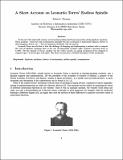Por favor, use este identificador para citar o enlazar a este item:
http://hdl.handle.net/10261/30460COMPARTIR / EXPORTAR:
 SHARE SHARE
 CORE
BASE CORE
BASE
|
|
| Visualizar otros formatos: MARC | Dublin Core | RDF | ORE | MODS | METS | DIDL | DATACITE | |

| Título: | A short account of Leonardo Torres' endless spindle |
Autor: | Thomas, Federico CSIC ORCID | Palabras clave: | Algebraic machines History of mechanisms Endless spindle Transmissions Automation |
Fecha de publicación: | 2008 | Editor: | Elsevier | Citación: | Mechanism and Machine Theory 43(8): 1055-1063 (2008) | Resumen: | At the end of the nineteenth century, several analog machines had been proposed for solving algebraic equations. These machines —based not only on kinematics principles but also on dynamic or hydrostatic balances, electric or electromagnetic devices, etc.— had one important drawback: lack of accuracy. Leonardo Torres was the first to beat the challenge of designing and implementing a machine able to compute the roots of algebraic equations that, in the case of polynomials of degree eight, attained a precision down to 1/1000. The key element of Torres’ machine was the endless spindle, an analog mechanical device designed to compute log(a + b) from log(a) and log(b). This short account gives a detailed description of this mechanism. | Versión del editor: | http://dx.doi.org/10.1016/j.mechmachtheory.2007.07.003 | URI: | http://hdl.handle.net/10261/30460 | DOI: | 10.1016/j.mechmachtheory.2007.07.003 | ISSN: | 0094-114X |
| Aparece en las colecciones: | (IRII) Artículos |
Ficheros en este ítem:
| Fichero | Descripción | Tamaño | Formato | |
|---|---|---|---|---|
| account of Leonardo.pdf | 351,34 kB | Adobe PDF |  Visualizar/Abrir |
CORE Recommender
SCOPUSTM
Citations
8
checked on 06-abr-2024
WEB OF SCIENCETM
Citations
7
checked on 29-feb-2024
Page view(s)
651
checked on 19-abr-2024
Download(s)
1.436
checked on 19-abr-2024
Google ScholarTM
Check
Altmetric
Altmetric
NOTA: Los ítems de Digital.CSIC están protegidos por copyright, con todos los derechos reservados, a menos que se indique lo contrario.
